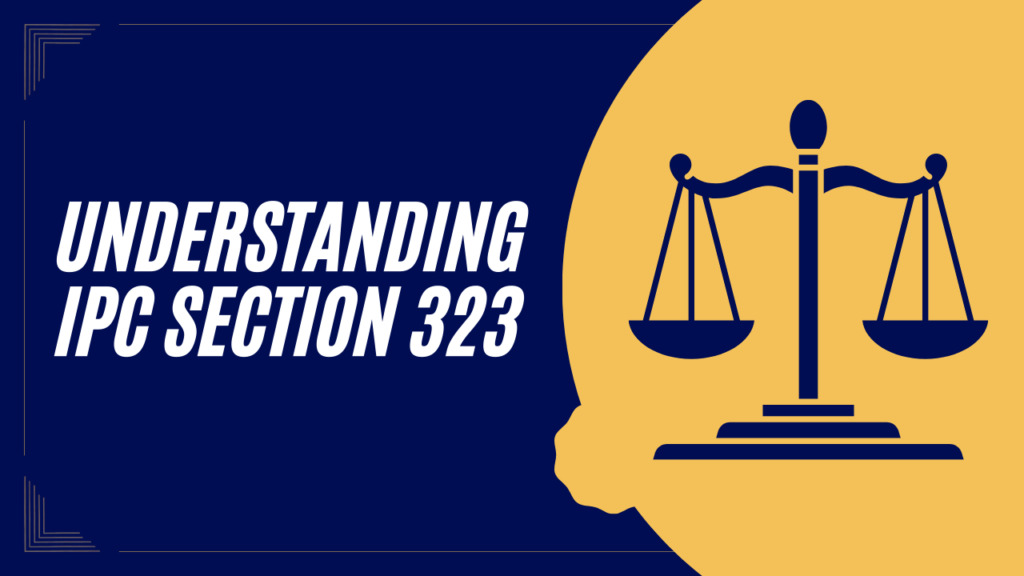Introduction to IPC Section 323
In the vast landscape of legal provisions in India, IPC Section 323 stands as a significant pillar, specifically focusing on the offense of causing ‘voluntary hurt.’ Understanding the nuances and legal implications of this section is crucial to comprehend the legal framework concerning physical altercations.
Scope and Provisions of IPC 323
IPC 323 delineates the consequences of causing voluntary hurt, presenting a nuanced view of the term ‘hurt’ and its implications within the legal domain. Exploring the legal boundaries and exceptions outlined in this section helps in understanding the gravity of the offense.
Context and Historical Background
To truly comprehend the essence of IPC Section 323, it’s imperative to delve into its historical context, understanding the societal norms and legal precedents that led to its inception. Exploring the evolution of these legal provisions provides insights into its current interpretation and implications.
Cases and Interpretations
Several legal cases have set precedence in interpreting and applying IPC Section 323, offering crucial insights into the practical implementation and implications of this legal clause. Examining these cases provides a clearer understanding of the section’s real-world impact.
Legal Perspective and Consequences
From a legal viewpoint, understanding the consequences and potential legal actions following an offense under IPC 323 is pivotal. Analyzing the legal framework and repercussions offers a deeper insight into the potential outcomes for the victim and accused.
Significance in Today’s Society
Amidst the changing societal dynamics, understanding the significance of IPC 323 is crucial. Analyzing its relevance in today’s context sheds light on its application and effectiveness in the contemporary legal scenario.
Critical Analysis of IPC Section 323
Conducting a critical analysis of IPC Section 323 helps unravel its strengths, weaknesses, and possible areas for improvement. Examining the section in detail aids in understanding its efficiency and limitations.
Impact on Victim and Accused
The consequences of offenses under IPC 323 have a profound impact on both the victim and the accused. Understanding these implications from both perspectives offers a holistic view of the legal proceedings and their aftermath.
Amendments and Future Changes
Considering the evolving societal norms and legal requirements, exploring the potential amendments or changes in IPC 323 becomes pertinent. Analyzing possible future alterations or advancements in this section is crucial for its adaptability.
Societal and Legal Implications
IPC Section 323 has broader societal and legal implications. Examining the section’s impact on society and the legal system helps understand its role in shaping societal norms and legal proceedings.
Practical Insights and Recommendations
Drawing practical insights and recommendations for better implementation and understanding of IPC 323 is essential. Offering suggestions for improvements enhances the effectiveness of this legal provision.
IPC Section 323: Explained
Meaning and Scope
IPC Section 323 addresses cases where an individual voluntarily causes hurt to another person. It elucidates the diverse forms of hurt and the varying degrees of injury.
Offenses Covered
This section primarily deals with offenses that entail simple hurt or bodily injuries, emphasizing the intent behind the act.
Punishments and Penalties
The section prescribes punishments for those found guilty of the offense. The penalties vary based on the severity of the injury inflicted.
Significance of IPC Section 323
Understanding the significance of IPC Section 323 entails recognizing its role in providing legal recourse to victims and establishing a system for justice and reparation.
Real-life Applications and Case Studies
Examining real-life instances and case studies helps in comprehending the practical application of IPC Section 323 and its implications in diverse scenarios.
Legal Implications and Relevance
Understanding the legal implications and relevance of IPC Section 323 within the larger legal framework is essential for upholding justice.
IPC 323 and Victim Protection
This section plays a crucial role in ensuring victim protection, offering a legal path for those who have suffered injuries due to deliberate actions.
Amendments and Current Status
Understanding the changes, amendments, and the current status of IPC Section 323 aids in comprehending its evolving nature.
Comparison with Other IPC Sections
Comparing IPC Section 323 with other relevant sections in the IPC provides insights into its distinct nature and scope.
Misconceptions and Clarifications
Addressing misconceptions and providing clarifications on IPC Section 323 helps in fostering a clearer understanding of its application.
Role of Legal Counsel and Defense
Understanding the role of legal counsel and defense in cases related to IPC Section 323 is pivotal in ensuring fair trials and justice.
Societal Impact and Awareness
The societal impact and awareness about IPC Section 323 influence its practical application and public perception.
Implementations and Challenges
Examining the implementations and challenges associated with IPC Section 323 sheds light on areas that require improvement within the legal system.
Future Prospects and Changes
Anticipating future prospects and changes in IPC Section 323 involves understanding the potential alterations and reforms in response to societal needs.
Conclusion: Summary of IPC Section 323
In summary, IPC Section 323 encapsulates the legal ramifications of causing voluntary hurt and holds a significant place in the Indian legal framework. Understanding its provisions, historical context, societal implications, and potential improvements is crucial for a comprehensive comprehension.
FAQs
- Is IPC Section 323 a bailable offense?
- What actions constitute ‘voluntary hurt’ under IPC 323?
- Are there any specific exceptions or defenses under IPC Section 323?
- What is the punishment for the offense under IPC Section 323?
- How can the accused defend themselves against charges under IPC 323?

